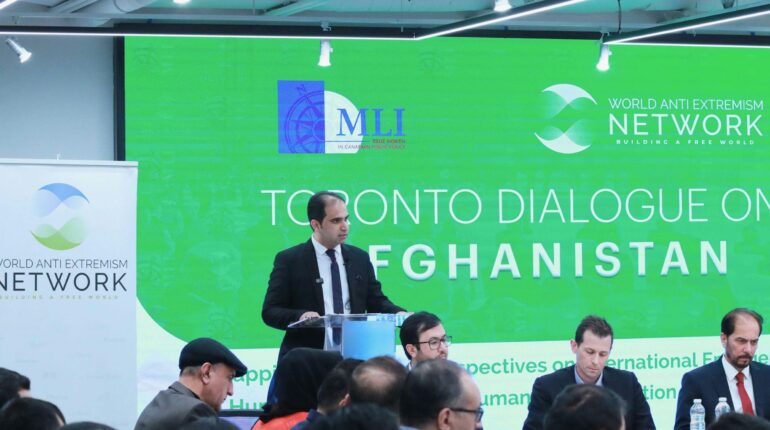
The Macdonald-Laurier Institute, Canada’s national public policy think tank, and the World Anti-Extremism Network, hosted a dialogue on March 11, 2024, in Toronto under the title of “Toronto Dialogue on Afghanistan”. The event brought together over 40 participants, including former Canadian diplomats, thought leaders, practitioners, representatives from international organizations and missions in Canada, Afghan scholars, human rights defenders, civil society activists, community leaders, and journalists.
The dialogue focused on the following three main topics:
- The outcomes of the recent Doha meeting on Afghanistan (18-19 February 2024), facilitated by the United Nations to streamline global interactions with Afghanistan.
- The dire humanitarian situation and the mechanisms for delivering aid to the people of Afghanistan.
- The human rights situation, particularly the rights of women and girls, and how to counter fundamentalism and extremist ideologies to not let Afghanistan become a security threat for the world again.
The dialogue was officially inaugurated by keynotes of Khalid Ramizy, the CEO of the World Anti-Extremism Network, who underscored the importance of these discussions and Canada’s role in Afghan affairs and how to not let Afghanistan become a safe place for terrorism and extremist groups. Subsequently, Jonathan Berkshire Miller, Director of Foreign Affairs, National Defense, and National Security at the Macdonald-Laurier Institute (MLI), elaborated on the significance and connection of such dialogues to Canada’s national interests and how these dialogues can play an important role in letting the world hear the true voice of Afghan people.
Following him as keynote speakers, Grant Kippen, an International Electoral and Democracy Advisor and a Member of our Board of Directors at WAEN, who has huge experience on Afghanistan issues by leading the National Democratic Institute and as Chief Electoral Advisor for the United Nations Assistance Mission in Afghanistan and other important responsibilities on democracy building in the country, shared his key points and thoughts about Lessons from Twenty Years of Afghanistan Democracy Journey and the Way Forward. Lotfullah Najafizada, CEO of Amu TV and representative of Afghanistan Civil Society in the Recent UN meeting in Doha on Afghanistan, was another keynote speaker of this dialogue, and he talked about Mapping Afghanistan’s Future: Insights from the Recent UN Meeting in Doha on Afghanistan by sharing his firsthand experience and what the Doha meeting can bring for Afghanistan and its people.
Prof. M. Abul Ahrar Ramizpoor, president of WAEN, Mohammad Ehsan Zia, Former Director of USIP in Afghanistan, Asma Faizi, president of Afghan Women’s Organization – Canada, Dr. Seddiq Weera, Afghan Scholar in Canada, and Gen. Zahir Wardak were also other panel speakers of this dialogue who talked and shared their ideas and thoughts about the human rights situation, the humanitarian situation, and Canada’s role in Afghanistan.
The key points of the participants’ discussion from this dialogue are as follows:
- Observations were made regarding the concentration of power in the hands of the president, the lack of necessary roles for representatives in development, the absence of transparency and accountability, and the ineffectiveness of political parties during the two decades of democracy in Afghanistan. These challenges have resulted in low levels of public participation in elections and the failure of democracy in the country.
- Based on statements from a dialogue member who participated in the recent Doha conference, the United Nations roadmap for interacting with Afghanistan, discussed at the conference, was seen as the only viable path to harmonize perspectives and cooperation among regional and Western countries on the Afghan issue, which will be a long-term process.
- It was noted that global unity on the issue of Afghanistan is not as strong as in the past. The upcoming Doha conference in May is considered another opportunity. The appointment of a special representative is a controversial issue that requires common agreement among regional players and Western countries.
- Drawing on the views of a former Canadian diplomat in Afghanistan, it became clear that further military action to revive democracy in Afghanistan is unimaginable. The Taliban’s efforts to manipulate the Afghan currency, extract resources, and the potential reduction of humanitarian aid highlight the complexities. Recognition of their regime is inconceivable until they respect women’s rights.
- Despite the interaction of regional countries with the Taliban, concerns persist about the absence of an inclusive government and women’s participation.
- Participants recalled Canada’s role in the reconstruction of Afghanistan during the republic, emphasizing the sacrifices of 156 military personnel and several Canadian nationals. Afghans remember and demand an active role for Canada in establishing stability.
- Mention was made of China’s alleged support for various terrorist groups, including the Taliban, Hamas, and Russia’s offensive against Ukraine, requiring further investigation.
- The Canadian government was urged to take serious measures against pro-Taliban elements attempting to promote Taliban radicalism in Canada. The recent display of the Taliban’s flag during a Palestinian demonstration raised concerns that should be investigated by Canadian law enforcement authorities.
- Participants highlighted the initiation and importance of such dialogues for the coherence of Afghan perspectives at home and abroad. They expressed interest in expanding these discussions among Afghan communities across Canada for a better understanding of the current situation in Afghanistan and fostering Canada’s active engagement in Afghan politics to establish peace and durable stability.
“This is a great initiative and I urge the Toronto Dialogue to facilitate conversations among Afghans on the fundamental issues of the country, which constitute the root causes of chronic poverty, prolonged instability, and social and political fragmentation,” said Mohammad Ehsan Zia, Former Director of USIP in Afghanistan.
“So happy to see such initiatives are now happening in Canada, especially mapping the future and discussing the future of the country is something very important, and I congratulate the organizers for this important work,” said Lotfullah Najafizada, CEO of Amu TV and Representative of Afghanistan Civil Society in the Recent UN Doha Meeting on Afghanistan.
It is mentionable that in this dialogue, we had the honor of participation of a number Canadian diplomats, including Deborah Lyons, who is a Canadian diplomat and served as Special Representative of the Secretary-General of the United Nations for Afghanistan and Canadian Ambassador to Afghanistan for years.
The World Anti-Extremism Network is committed to organizing such gatherings about Afghanistan and how we can counter extremism and fundamentalism not only in Canada but also in different other countries too, in order to not let the extremist ideologies win.
Together for Freedom in Afghanistan!
You can watch the VOA Dari Report here, and also you can read their written report by clicking here.
For media matters, you can contact us at: hq@WorldAntiExtremism.org











